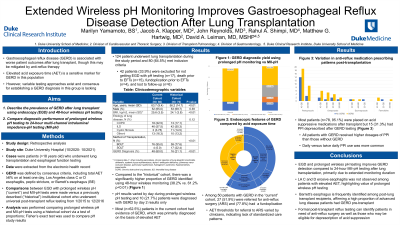Monday Poster Session
Category: Esophagus
P1833 - Extended Wireless pH Monitoring Improves Gastroesophageal Reflux Disease Detection After Lung Transplantation
Monday, October 23, 2023
10:30 AM - 4:15 PM PT
Location: Exhibit Hall

Has Audio

Marilyn Yamamoto, BS
Duke University School of Medicine
Durham, NC
Presenting Author(s)
Marilyn Yamamoto, BS1, Jacob Klapper, MD2, John Reynolds, MD2, Rahul Shimpi, MD2, Matthew Hartwig, MD2, David Leiman, MD, MSHP2
1Duke University School of Medicine, Durham, NC; 2Duke University Medical Center, Durham, NC
Introduction: Gastroesophageal reflux disease (GERD) is associated with worse patient outcomes after lung transplant, though this may be mitigated by anti-reflux surgery. A testing strategy to maximize GERD detection is therefore desirable. Acid exposure time (AET) is a sensitive marker for diagnosing GERD and identifying high risk patients in this population. We aimed to describe the prevalence of GERD after lung transplant using prolonged wireless pH testing and assess its diagnostic performance compared to 24-hour multi-channel intraluminal impedance-pH testing (MII-pH).
Methods: We performed a retrospective study of consecutive patients who underwent lung transplantation from October 2020 to October 2022 with subsequent endoscopy (EGD) and 48-hour wireless pH testing. GERD was defined by consensus criteria, including total AET ≥6% on at least one day, Los Angeles class C or D esophagitis, peptic stricture, or Barrett’s esophagus (BE). Clinicodemographic data, including age, underlying lung disease, and reflux management strategies were extracted from the health record. Analyses were performed using Fisher’s exact test and test of proportions. Comparisons between prolonged wireless pH and MII-pH tests were made against a previously described institutional cohort who underwent universal post-transplant reflux testing from January 2015 to December 2016.
Results: 80 patients (median age 65.6, 64.6% male) were included and 48 (60.0%) were diagnosed with GERD, primarily (n=36, 75%) based on elevated AET (Table 1). The pH results varied significantly by study day (p< 0.01), including 10 (27.8%) GERD patients diagnosed based on elevated AET on day 2 only and 21 (43.8%) who had elevated AET on both days 1 and 2 (Figure 1A). Overall, 12 (14.6%) patients had BE and 26 (31.7%) had erosive esophagitis, though elevated AET was the most common criterion confirming a GERD diagnosis (Figure 1B). Compared to the historical cohort (n=76), there was a significantly higher proportion of GERD identified using 48-hour wireless monitoring (21.1% vs. 61.2% p< 0.01).
Discussion: Compared to historical estimates, prolonged wireless pH testing results combined with consensus EGD criteria increases the sensitivity for detecting GERD. Compared to 24-hour MII-pH testing alone, prolonged wireless pH monitoring significantly improves diagnostic sensitivity. Given the importance of GERD to patient outcomes after lung transplant, extended reflux monitoring provides an advantageous approach for diagnostic testing in this population.

Disclosures:
Marilyn Yamamoto, BS1, Jacob Klapper, MD2, John Reynolds, MD2, Rahul Shimpi, MD2, Matthew Hartwig, MD2, David Leiman, MD, MSHP2. P1833 - Extended Wireless pH Monitoring Improves Gastroesophageal Reflux Disease Detection After Lung Transplantation, ACG 2023 Annual Scientific Meeting Abstracts. Vancouver, BC, Canada: American College of Gastroenterology.
1Duke University School of Medicine, Durham, NC; 2Duke University Medical Center, Durham, NC
Introduction: Gastroesophageal reflux disease (GERD) is associated with worse patient outcomes after lung transplant, though this may be mitigated by anti-reflux surgery. A testing strategy to maximize GERD detection is therefore desirable. Acid exposure time (AET) is a sensitive marker for diagnosing GERD and identifying high risk patients in this population. We aimed to describe the prevalence of GERD after lung transplant using prolonged wireless pH testing and assess its diagnostic performance compared to 24-hour multi-channel intraluminal impedance-pH testing (MII-pH).
Methods: We performed a retrospective study of consecutive patients who underwent lung transplantation from October 2020 to October 2022 with subsequent endoscopy (EGD) and 48-hour wireless pH testing. GERD was defined by consensus criteria, including total AET ≥6% on at least one day, Los Angeles class C or D esophagitis, peptic stricture, or Barrett’s esophagus (BE). Clinicodemographic data, including age, underlying lung disease, and reflux management strategies were extracted from the health record. Analyses were performed using Fisher’s exact test and test of proportions. Comparisons between prolonged wireless pH and MII-pH tests were made against a previously described institutional cohort who underwent universal post-transplant reflux testing from January 2015 to December 2016.
Results: 80 patients (median age 65.6, 64.6% male) were included and 48 (60.0%) were diagnosed with GERD, primarily (n=36, 75%) based on elevated AET (Table 1). The pH results varied significantly by study day (p< 0.01), including 10 (27.8%) GERD patients diagnosed based on elevated AET on day 2 only and 21 (43.8%) who had elevated AET on both days 1 and 2 (Figure 1A). Overall, 12 (14.6%) patients had BE and 26 (31.7%) had erosive esophagitis, though elevated AET was the most common criterion confirming a GERD diagnosis (Figure 1B). Compared to the historical cohort (n=76), there was a significantly higher proportion of GERD identified using 48-hour wireless monitoring (21.1% vs. 61.2% p< 0.01).
Discussion: Compared to historical estimates, prolonged wireless pH testing results combined with consensus EGD criteria increases the sensitivity for detecting GERD. Compared to 24-hour MII-pH testing alone, prolonged wireless pH monitoring significantly improves diagnostic sensitivity. Given the importance of GERD to patient outcomes after lung transplant, extended reflux monitoring provides an advantageous approach for diagnostic testing in this population.

Figure: Figure 1A: The use of prolonged wireless pH testing increases the sensitivity for detecting GERD based on acid exposure time (AET) among lung transplant patients compared to 24-hour multi-channel intraluminal impedance-pH testing (MII-pH), which is based primarily on the additional day of pH data.
Figure 1B: Criteria by which patients were diagnosed with GERD. Overall, most patients with EGD and prolonged wireless pH testing had evidence of GERD, which was primarily diagnosed on the basis of elevated AET versus meeting endoscopic consensus criteria.
Figure 1B: Criteria by which patients were diagnosed with GERD. Overall, most patients with EGD and prolonged wireless pH testing had evidence of GERD, which was primarily diagnosed on the basis of elevated AET versus meeting endoscopic consensus criteria.
Disclosures:
Marilyn Yamamoto indicated no relevant financial relationships.
Jacob Klapper indicated no relevant financial relationships.
John Reynolds indicated no relevant financial relationships.
Rahul Shimpi indicated no relevant financial relationships.
Matthew Hartwig indicated no relevant financial relationships.
David Leiman: Astra Zeneca – Consultant. Bristol Myers Squibb – Stock-publicly held company(excluding mutual/index funds). Medtronic – Consultant. Novo Nordisk – Consultant. Sanofi – Advisor or Review Panel Member. Takeda – Grant/Research Support.
Marilyn Yamamoto, BS1, Jacob Klapper, MD2, John Reynolds, MD2, Rahul Shimpi, MD2, Matthew Hartwig, MD2, David Leiman, MD, MSHP2. P1833 - Extended Wireless pH Monitoring Improves Gastroesophageal Reflux Disease Detection After Lung Transplantation, ACG 2023 Annual Scientific Meeting Abstracts. Vancouver, BC, Canada: American College of Gastroenterology.

